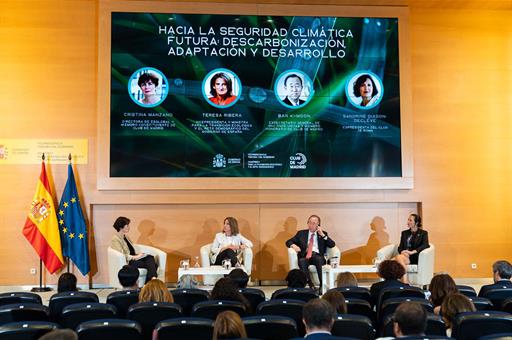Teresa Ribera and Ban Ki-moon: "Climate reality is stubborn. Ignoring it sets back decades of development"
News - 2022.6.23
A special participant at the meeting, entitled 'Towards Future Climate Security: Decarbonisation, Adaptation and Development', was Sandrine Dixson-Decléve, co-president of the Club of Rome. Cristina Manzano, director of EsGlobal and constituent member of the Club de Madrid, was the moderator.
The speakers agreed on the need to promote greater multilateral action to bring together the political will and leadership capable of accelerating climate action and integrating social justice "vis-à-vis the converging crisis and uncertainty" that defines the moment we are living in. "We are facing an enormously complex situation: a triple international crisis, marked by pandemics, energy and geopolitics; and a triple environmental crisis, reflected in climate change, pollution and biodiversity loss," the vice-president said.
"In these difficult times exacerbated by Covid-19 and Russia's aggression in Ukraine, we must redouble our efforts to meet the goal of containing global temperature rise to below 1.5 degrees Celsius," said the 8th UN Secretary General. "Carbon neutrality by 2050 is the path to a sustainable future for all". Ban Ki-moon also stressed the need to work together: "No matter how many resources a country has, no one country can meet this challenge alone".
Sandrine Dixson-Decléve called for "real cooperation" between economies, "which is not determined by GDP growth alone. Other social and environmental indicators are needed. "We must be ambitious and realise that the fight against the climate and environmental crisis is the greatest challenge for humanity," he added.
A race against time
Climate change is a critical issue for the current and future well-being of citizens and for the balance of ecosystems. Climate impacts are occurring earlier and with greater intensity than expected, and are disproportionately hitting the most vulnerable communities.
"Climate reality is stubborn, and ignoring it sets back decades of development," said Vice-President Ribera. "We are in a race against time. We must address the twin environmental and social crises by accelerating climate action, while protecting the most vulnerable". Scientific projections warn of the devastating effects of extreme events, rising temperatures and rising sea levels.
These impacts are in addition to other risks in developing countries, stemming from their high exposure (transitional, arid, flood-prone areas, etc.); their socio-economic vulnerability, which compromises resilience; and their limited adaptive capacity, including the lack of safety nets, technologies, institutional capacity and public investment.
"Vulnerable communities in developing countries are the least responsible for climate change, but suffer the most from its negative effects. Improving capacities, financing and support to scale up adaptation responses and prevent further loss and damage is critical," concluded Teresa Ribera.
Non official translation





